ADUN SPEAKS | When history is finally written, former prime minister Najib Abdul Razak will be remembered as Malaysia’s worst self-serving kleptocrat with an insatiable appetite for luxurious enjoyment.
He was once at the apex, but he has his own foolishness to thank for the downfall and imprisonment he is now going through.
I was first elected to Parliament in March 2008. In June that year, deputy prime minister Najib, who was also defence minister, was waiting for his turn to speak at the Shangri-la Dialogue in Singapore.
I went up to him and had my only conversation ever with him. I introduced myself as “Bukit Bendera”, the name of my then constituency.
Almost instantly, he told me he appreciated that DAP leaders were less “crazy” about the Altantuya case. Then, he claimed he was a leader for a multiethnic Malaysia. It was a weird exchange.
That chance meeting left me with an impression that he was a quick-witted politician and he knew that the Altantuya case was an albatross around his neck. Otherwise, why would he tell a stranger about the case in the first instance?
Najib’s road to premiership
Opposition leader Anwar Ibrahim’s claim of a Sept 16 change of government came and went but this threat to Umno and BN rule was slyfully used by Najib and Muhyiddin Yassin to force the hand of then prime minister Abdullah Badawi to relinquish power.
On Sept 17, 2008, Abdullah was forced to give up the much coveted finance portfolio to Najib. Having tasted blood, Najib and Muhyiddin went to Abdullah again a week later. This time, Abdullah agreed to step down in April 2009.
Abdullah permitted a very lively media scene. The unwritten rule then was that as long as the prime minister was not criticised, all other criticisms backed by facts were acceptable.
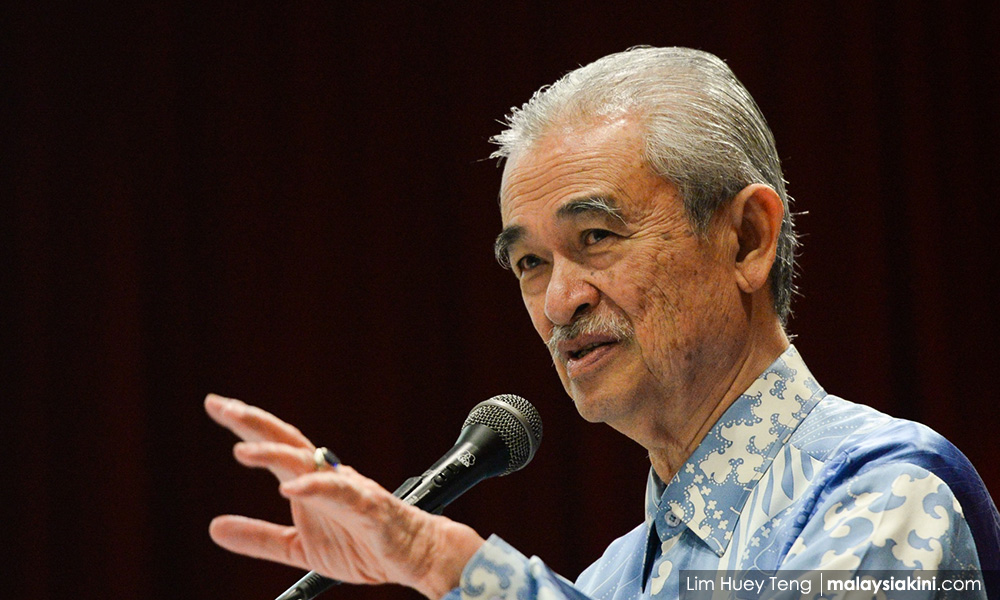
But by January 2009, it was clear the short-lived media freedom would end soon. Astro decided to shut down some very popular talk shows just before Najib took over the reins.
Najib was determined to instill fear and reverse the clock to the more authoritarian time of the past. Abdullah’s failure in the 2008 general election was interpreted by Najib as him not being stern enough towards the media and not able to strike fear among the noisy opposition and NGOs like Bersih.
In February 2009, Najib as deputy prime minister engineered the collapse of the Pakatan Rakyat Perak state government by inducing several elected representatives to cross over in what was a precursor to the Sheraton coup.
Among Umno circles and the old establishment, many felt Abdullah could have prevented Pakatan Rakyat from taking power in Kedah, Perak, and Selangor in March 2008 by stitching together Umno-PAS Malay unity governments.
PAS president Abdul Hadi Awang had no qualms about signing up for such an arrangement, but not the upright Tok Guru Nik Abdul Aziz Nik Mat.
Nik Aziz’s objection to working with Umno at that time effectively delayed an official Umno-PAS collaboration by a decade, until after the 2018 election.
Najib showed his true colours even before he took power: he is in no way a democrat, with no respect for media freedom nor the political mandate given to opposition parties by the people in elections. And, Najib is more than ready to manipulate PAS to his advantage.
If anything, becoming prime minister only fostered these reprehensible beliefs.
Najib at the apex
Najib the prime minister had no guiding principles, philosophy, or conviction. He was a transactional leader whose only purpose was to stay in office for as long as possible. Several characteristics stood out:
First, cash is king
I think we all know this by now. Najib knew he was not loved, he was never a charismatic or visionary leader. Former prime minister Dr Mahathir Mohammad and PKR president Anwar Ibrahim were always more popular than Najib.
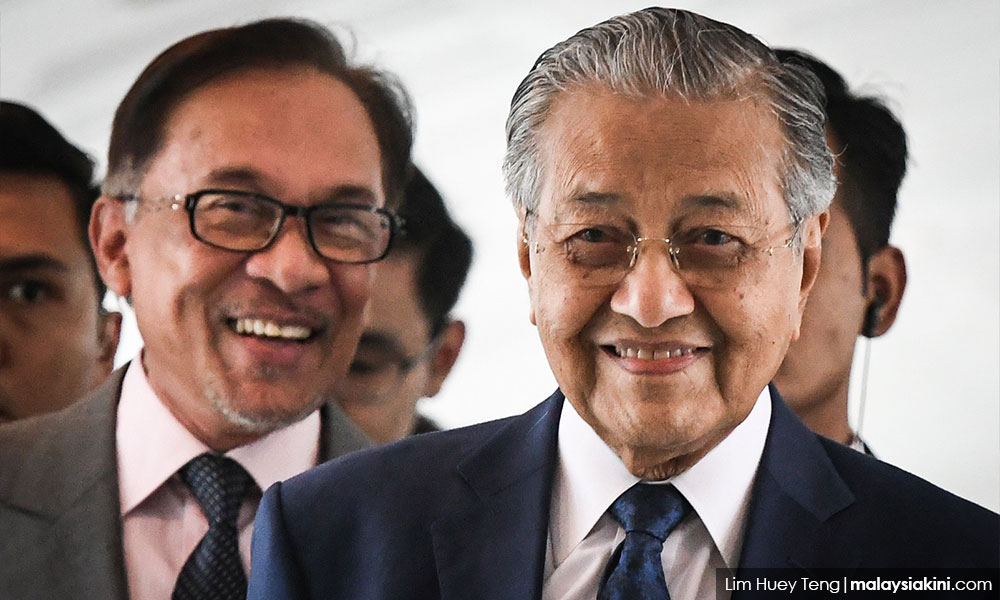
He made up for his lack of popularity by buying support with money, inside Umno and among the population.
Najib genuinely believed money could buy him support and loyalty. He could never comprehend why people would fight for justice and dignity.
Second, excessive use of consultants, hollow outcomes
Najib had been in the system long enough to know he needed to be seen doing something good for the nation although he clearly had no idea what to do and he didn’t think the civil service knew either.
Hence Najib governed through consultants and made policy decisions by way of PowerPoint presentations. 1Malaysia was a slogan without much substance proposed by a PR consultant.
With Pemandu, Idris Jala was the “in-house” consultant trying to make piecemeal cosmetic changes to impress voters. A Korean consultant, W Chan Kim, of Blue Ocean Strategy fame, also landed himself a consultant role with Najib.
They came up with the National Blue Ocean Strategy and one of the first initiatives was putting prisoners in army camps.
Military leaders were furious that prisons were set up in six army camps, which was a clear manifestation of the inability of Najib, Idris Jala, and Chan Kim, to appreciate the real purpose and functions of the armed forces, and the different roles of the prison department and the military.
Third, a blatant lack of empathy
Najib is the ultimate princeling who doesn’t understand the lives of ordinary people. When he introduced the Goods and Services Tax (GST) as a silver bullet to cover up plundered national coffers, he failed to understand the core economic problem the country faced.
Most Malaysians are not paying income tax because they are in the bottom strata and do not meet the minimum income threshold. The real challenge was to raise income, not taxes.
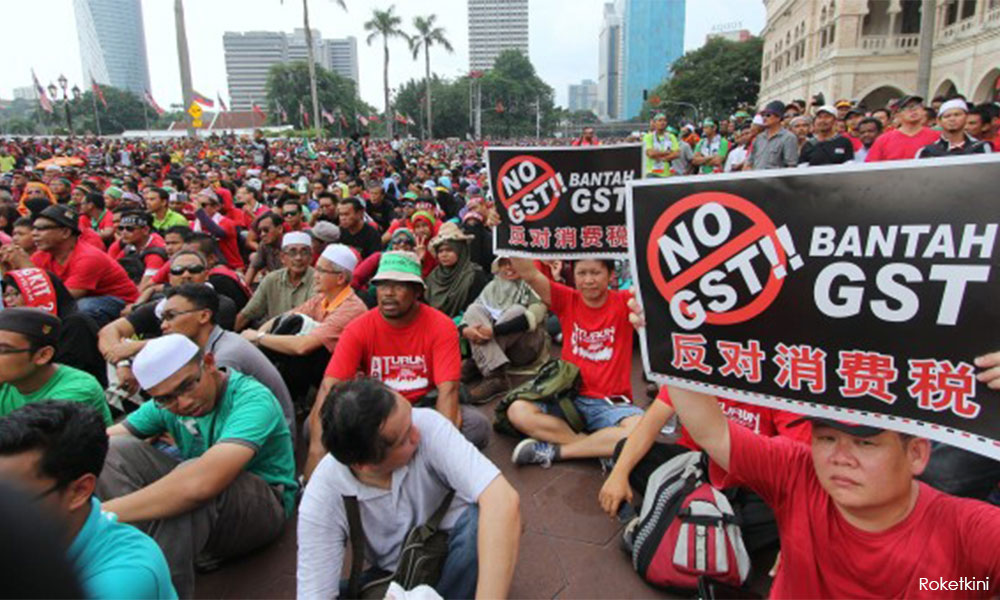
Najib became a hated figure when GST was implemented in April 2015, which coincided with the sharp decline of global petrol prices, which prompted Najib to cut federal budget allocations massively in 2015 and 2016.
And then he encouraged us to take quinoa for good health.
Fourth, imagined impunity
Najib and his wife Rosmah Mansor governed as if they would never fall, that they would always be at the apex of power.
The blatant disregard for law, rules, and norms were unbelievable. Committing crimes so brazenly is unforgivable, but what’s crazier is they never bothered to stay an arm’s length away from the incriminating evidence of their financial crimes.
The SRC case which sent Najib to jail is a case in point. Because Najib felt the need to buy support from his associates, he needed cash in his bank account, to be issued with cheques signed under his own name to the Umno and BN warlords.
These left behind a money trail. Najib and Rosmah made themselves sitting ducks because they had this distorted sense of legal immunity.
Fifth, no respect, no mercy for his opponents
Najib used the state apparatus at his disposal to inflict cruelty on his opponents. The long list of people threatened with their lives or at least with lawsuits for exposing the 1MDB scandal need not be mentioned here.
Muhyiddin told me he was tailed by Special Branch officers after he was sacked as deputy prime minister in July 2015.
Najib also jailed his biggest political opponent at that time, Anwar.
When Najib called Anwar twice by phone on election night in 2018, he must have regretted the 2015 decision to imprison Anwar as it forced the opposition to realign and eventually became a force that unseated his government.
On May 9, 2018, Anwar was still held as a prisoner at a government health facility in Cheras.
Najib was hoping Anwar would agree to form the government with Umno on the assumption that Pakatan Harapan would not have enough seats.
Miraculously, Harapan won 113 seats on election night, crossing the 112 line by a hair’s breadth.
Political miscalculations
When Najib came into office in 2009, Umno was no longer the hegemon it once was.
In 2008, the opposition broke BN’s stranglehold on the two-thirds majority in Parliament.
The opposition also captured Kedah, Penang, Perak, and Selangor, on top of Kelantan. That election, the opposition received 49 percent of the popular votes while BN was at 51 percent.
It should have been a wake-up call for Najib to reform Umno-BN. But that was not to be. He set out on a mission to crush the opposition and strengthen the one-party state.
In 2013, BN won a tawdry victory under Najib’s premiership, where it received 47 percent of the votes and the opposition coalition Pakatan Rakyat, which consisted of DAP, PKR, and PAS at that time, received 51 percent.
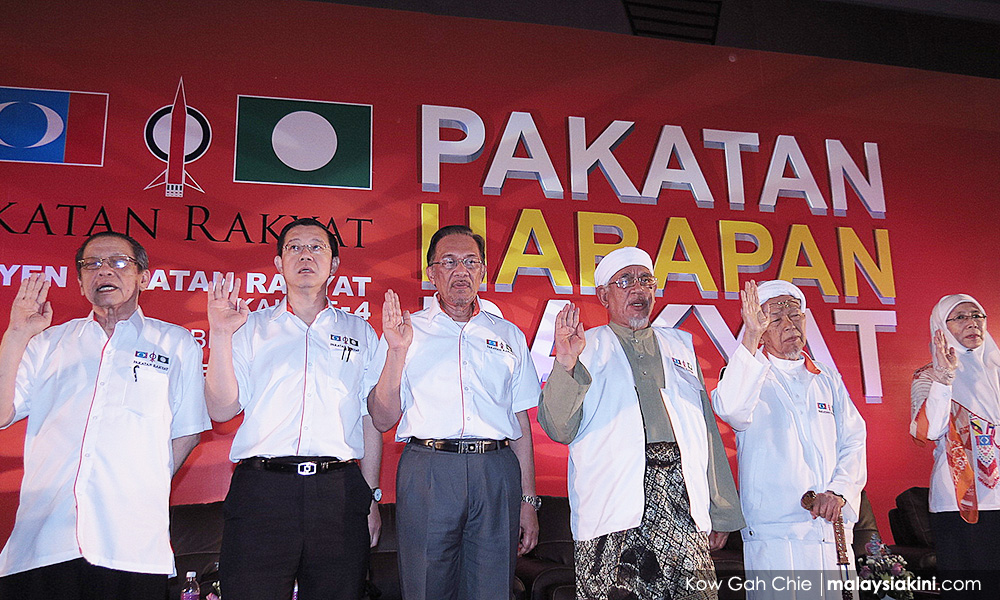
Gerrymandering allowed BN to hold on to a bigger share of seats with less vote share.
He still refused to budge.
In Najib’s near-decade rule, there was not a single attempt to amend the Constitution, which requires a two-thirds majority in the lower house of the Parliament, the Dewan Rakyat.
The reason was simple: Najib could never bring himself to negotiate with the opposition.
In comparison, constitutional amendments took place thrice after 2018, once to lower the voting age to 18 and to bring about automatic voter registration, another to reinstate Sabah and Sarawak as ‘territories’, and finally the most recent one was to pave the way for an anti-party-hopping law.
There were talks between Najib’s men and Anwar’s lieutenants between the May 2013 election and National Day on Aug 31, 2013, to explore collaboration but that did not go very far.
There wasn’t political will on the part of Najib to accommodate the parliamentary opposition.
Instead, Najib pursued a 3-pronged strategy:
First, to remove Anwar from the scene hence removing the alternative prime ministerial candidate.
Second, to lure PAS into Umno’s fold via a Muslim unity platform.
Third, to paint the opposition as DAP and Chinese-dominated, thus unworthy of support from the Malay electorate.
Anwar was sent to prison on Feb 10, 2015, depriving the opposition of a prime ministerial candidate. Nik Aziz passed away on Feb 12, 2015 thus removing the only hurdle for PAS to align with Najib.
In June 2015, PAS split right in the middle. The hardliners who very much preferred to get closer to Najib ousted the moderates at the party election, who then exited the party to form Parti Amanah Negara.
I am made to understand that with increasingly damaging details about Najib’s misconduct in the 1MDB case being leaked, there were efforts in 2015 to persuade Najib to retire gracefully in exchange for protection and amnesty.
If he ever thought of the slim possibility that he would one day end up in prison, a well-arranged exit could have prevented the fall of Umno, BN, and himself.
But Najib and Rosmah were never able to envisage any political order other than the one in which they were at the top and untouchable.
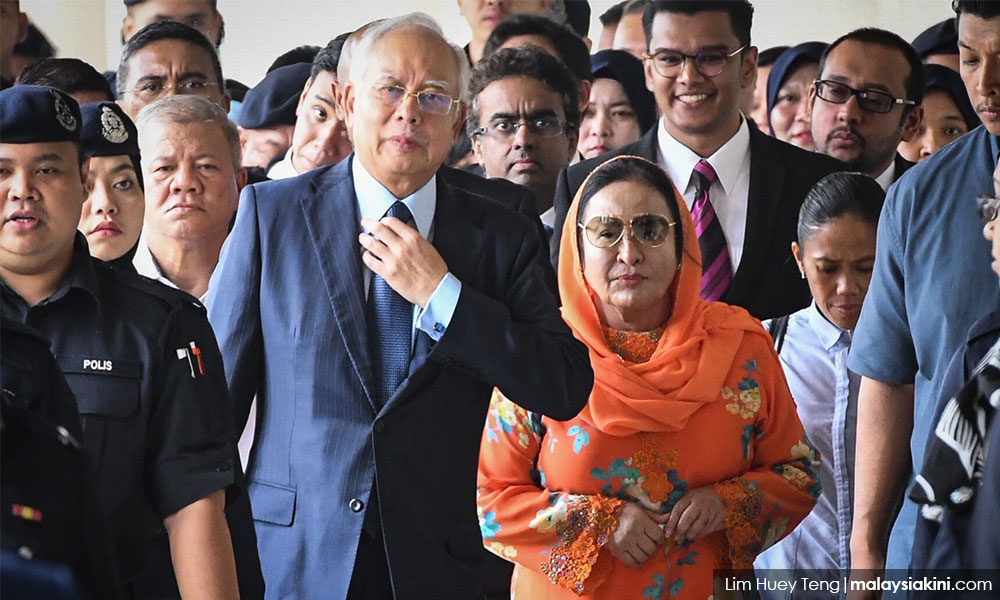
BN won massively in the Sarawak election on May 7, 2016. Umno also won two concurrent by-elections in Sungai Besar and Kuala Kangsar on June 18, 2016.
Much as Najib was constantly under pressure by the leaks and reports about the 1MDB scandal, he was in a very comfortable position.
The assumption, arising from the twin by-elections, was that Umno and PAS could go into three-corner fights with Harapan, which was thought to be advantageous to Umno.
Malays who were unhappy with Najib and Umno would vote for PAS. As long as their votes did not go to Harapan, Umno would win.
Najib conceived this grand strategy in March 2014 but became complacent and was caught by surprise by the game-changers introduced by his opponents.
He never expected the opposition to come together, reaching an accommodation between Mahathir and Anwar on July 14, 2017; and on Jan 7, 2018, agreeing on Mahathir as the seventh prime minister and Anwar as the eighth, settling the leadership question in anticipation of the election.
Najib recently said in hindsight that he considered dissolving Parliament in August 2017. Actually, I would argue that given the Mahathir-Anwar accommodation was newly achieved in July 2017, even an August election might not have saved Najib.
Each of Najib’s gambits, such as deregistering Bersatu just before the dissolution of Parliament and setting polling day on Wednesday, a work day, caused more uproar among Malaysians towards him and his government.
The grand chessboard was now in the hands of his opponent, Harapan.
During the campaign period, I was stunned watching a televised speech of Najib who claimed the huge turnouts at opposition rallies in Malacca and Putrajaya were because busloads of supporters were sent in from out of town.
I knew very well that all ceramah-goers came voluntarily without any payment or transport.
Najib was also highly confident of winning, claiming to “know the reality on the ground” and “have a strong base”. He and his inner circle were deluded to think BN would win with a two-thirds majority. He was completely out of touch and misguided.
I commented at that time, Najib was like Hitler in his final days, hiding in a bunker, rising only sparingly and firing a few shots aimlessly.
Fighting for survival post-2018
After the fall of the BN federal government in GE14, Najib should have known he would eventually end up in jail. He tried to leave the country but was stopped.
On June 30, 2018, with Najib’s support, Umno elected Ahmad Zahid Hamidi as its president. Instead of electing a new group of leaders to renew and rebuild Umno to win power at the next general election, the party was held ransom by Najib and Zahid.
They knew they had to destroy the Harapan government if they wanted to stay out of jail, or better still for them, make a strong comeback.
Umno went on a scorched earth policy to burn the house down for the Harapan government. Najib took on a new persona - “Malu Apa Bossku” - on Facebook since the Cameron Highlands by-election in January 2019.
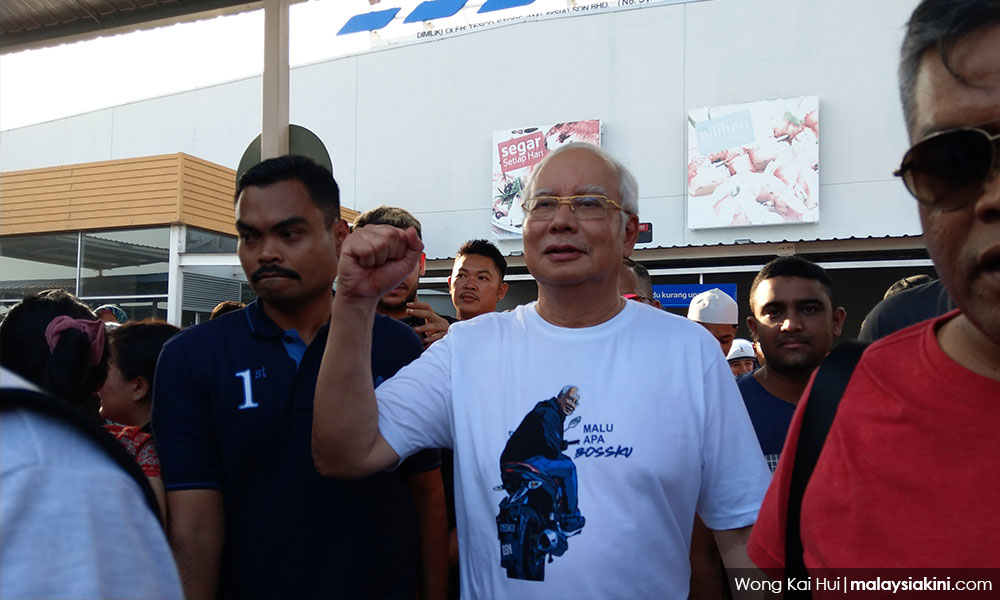
Umno aligned with PAS from October 2018 onwards and together launched an anti-Icerd demonstration on Dec 8, 2018.
Najib and Zahid engineered attacks after attacks on Harapan. They also played an instrumental role in the February 2020 Sheraton Move.
Their aim was to free themselves from their legal cases. Subsequently, not getting what they wanted from the Muhyiddin government, they went on to bring down Muhyiddin.
And, since the installation of Ismail Sabri Yaakob as prime minister in August 2021, Najib and Zahid have been pushing for snap polls and already caused state-wide elections in Malacca and Johor in November 2021 and March 2022, respectively.
Now that Najib has fallen, Zahid won’t hold up for too long. Hypothetically, had Najib apologised to the nation, removed himself from politics, and begged for some form of amnesty the moment he was defeated in 2018, the outcomes would have been very different.
Postscript
In our recent battles with Najib’s Facebook admins over the question of the littoral combat ships (LCS), I realised Najib has not changed.
Facts don’t matter to him. He was just putting out false narratives without even knowing if those postings would boomerang on himself later.
I believe that one of the reasons why the LCS became such a massive national sensation was because Najib kept talking about it, at times with nearly 10 Facebook postings each day.
Najib would listen to consultants who sound smart but hardly know anything really, such as Idris Jala or Chan Kim. You now see their new incarnations in Zaid Ibrahim and Hisyam Teh. They probably helped speed up his entry to prison.
Najib has never been strategic. He committed too many follies - political or otherwise - along the way. I know there are still many who think he will come back one day. I am more than ready to write his political obituary.
LIEW CHIN TONG is the state assemblyperson for Perling, Johor, the DAP deputy secretary-general, and a former deputy minister of defence.
The views expressed here are those of the author/contributor and do not necessarily represent the views of Malaysiakini.

